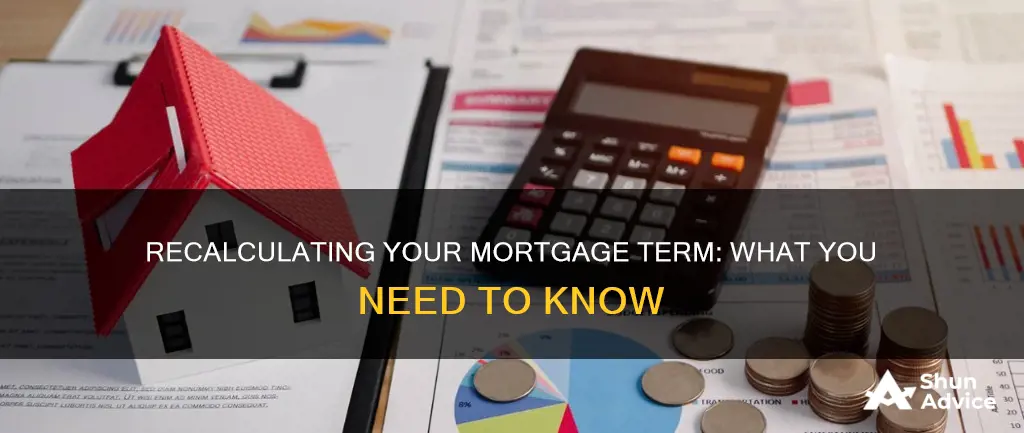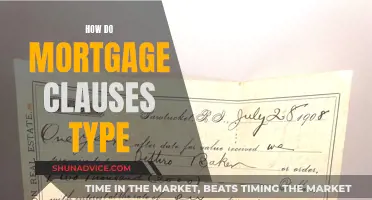
If you're considering recalculating your mortgage term, it's important to understand the factors involved. The loan term, interest rate, and down payment are key components in determining your monthly mortgage payments. Online mortgage calculators can be a valuable tool for estimating monthly payments, comparing different loan scenarios, and understanding the impact of changing your loan term. These calculators can also help you evaluate the potential savings from making extra payments or paying off your mortgage early. Additionally, it's worth considering refinancing options, which may involve taking out a new mortgage with a different interest rate and term to pay off an existing loan. Understanding the financial implications of changing your mortgage term is crucial before making any decisions.
What You'll Learn

How does refinancing a mortgage work?
Refinancing a mortgage involves taking out a new loan to pay off your original mortgage. This is usually done to obtain more favourable terms, such as a lower interest rate or monthly payment, or to change the duration of the loan. The process of refinancing a mortgage is similar to the process of obtaining your first mortgage loan. Your lender will ask for the same information you gave when you bought the home, including your income, assets, debt and credit score. They will use this information to determine whether you meet the requirements to refinance and can pay back the loan.
When refinancing, you can change the loan type and your lender. You may be given the option to lock your interest rate so that it doesn't change before the loan closes, or you can choose a float rate, which means the rate is not locked before proceeding with the loan. This may allow you to get a lower rate, but it also puts you at the risk of getting a higher rate as it fluctuates.
Refinancing can provide a way to tap into the equity you have in your property. If the value of your house has increased, you can likely take out a refinance mortgage with a higher balance than your existing one, resulting in cash back. However, this means you will have a higher monthly payment and extra interest payments.
It is important to note that refinancing may come with upfront costs, and you may be extending the number of years you will be making mortgage payments. Therefore, it is crucial to understand the refinancing process and make sure it aligns with your financial goals.
Putting Your Mortgage Deed in a Trust: What You Need to Know
You may want to see also

What is a prepayment penalty?
When looking at home loans, it's important to pay attention to prepayment penalties. A prepayment penalty is a fee that some lenders charge if you pay off all or part of your mortgage early. It is designed to discourage borrowers from settling a loan early, long before the term ends. It is an incentive for borrowers to pay back their principal on schedule for a loan's entire term, allowing mortgage lenders to collect their planned interest. Prepayment penalties are added to a mortgage contract to protect lenders from the loss of interest payments over the life of the loan.
Prepayment penalties are becoming less common, and they do not usually apply if you pay extra principal on your mortgage in small amounts over time. However, if you pay off a large amount of your mortgage all at once, you may be charged a prepayment penalty. This fee will vary depending on the lender and the loan. Some common models used by lenders to determine the prepayment penalty cost include a percentage of the remaining loan balance, a lender-specified number of months' interest, a fixed amount, or a sliding scale based on mortgage length. For example, a lender may charge 2% of the outstanding principal as a penalty fee if the mortgage is paid off within the first 2 or 3 years of the loan term.
There are two types of prepayment penalties: soft and hard. A soft prepayment penalty only applies when you refinance or pay off a large portion of your mortgage loan during the early years of the loan. With a soft prepayment penalty, you can sell your home without incurring a penalty. On the other hand, a hard prepayment penalty applies to any prepayment, including refinancing, paying off a significant portion of the loan, or selling the home. If your mortgage has a hard prepayment penalty, paying off your mortgage early might not be the best financial decision, as you will have to pay a lump sum to your lender.
Before deciding to pay off all or part of a mortgage early, it is important to consider the potential impact on your credit score and evaluate the total costs by comparing different loans. Borrowers should read the fine print or ask the lender to understand how prepayment penalties apply to their loan.
Paying Off Your Chase Mortgage: Strategies for Success
You may want to see also

How does my down payment affect my mortgage?
The size of your down payment can have a significant impact on your mortgage in several ways. Firstly, it can affect your interest rate. A larger down payment reduces the risk for the lender, and they may offer a lower interest rate in exchange for a higher upfront sum. A lower interest rate, in turn, means lower monthly payments.
A higher down payment will also shrink your loan balance immediately, again resulting in lower monthly payments. It can also help you avoid paying mortgage insurance. Lenders often require mortgage insurance when the down payment is less than 20% to protect themselves against potential financial loss if you default on the loan. This insurance can add several hundred dollars to your monthly payments.
The down payment also shows lenders that you are capable of saving and investing money, and it can affect the type of loan you qualify for, as some loans have minimum down payment requirements.
There are many mortgage calculators available online that can help you compare the potential costs of different down payment sizes. These calculators take into account factors such as the term, interest rate, and loan amount, and can provide an estimate of your monthly payments and total interest costs.
Offering Private Mortgages: A Comprehensive Guide for Lenders
You may want to see also

How do I calculate my monthly mortgage payments?
To calculate your monthly mortgage payments, you can use a mortgage calculator. These are available online and can help you to estimate your monthly payments. You can also calculate your monthly mortgage payments manually using a formula.
There are several free mortgage calculators available online, including those by Bankrate, Zillow, and U.S. Bank. These calculators can help you to estimate your monthly mortgage payments, including principal and interest, as well as any additional costs such as property taxes, insurance, and private mortgage insurance (PMI). To use these calculators, you will need to input information such as the purchase price or amount of the loan, the length of the loan term, the interest rate, and your ZIP code.
In addition to these basic calculators, there are also more specialized ones. For example, Zillow offers a VA home loan calculator for qualifying veterans, active military, and military families. Bankrate also offers a refinance calculator to help you decide if refinancing your existing mortgage is a good financial decision.
If you prefer to calculate your monthly mortgage payments manually, you can use the following formula:
> M = P x i x (1 + i)^n / [(1 + i)^n – 1]
In this formula, M is the monthly mortgage payment, P is the principal loan amount, i is the interest rate (expressed as a decimal), and n is the number of payments.
It's important to note that your monthly mortgage payment may also include additional costs such as property taxes, homeowners insurance, and PMI if your down payment is less than 20% of the home's purchase price. These additional costs can increase your monthly payment, so it's essential to consider them when planning your budget.
Maximizing RRSP Benefits: Mortgage Interest and Tax Returns
You may want to see also

How does my interest rate affect my mortgage?
Interest rates are the cost of borrowing money. When you take out a mortgage, you pay back the amount you borrowed (the principal) plus interest. The interest rate you pay on a mortgage depends on a variety of factors, including the economic climate, interest rates set by central banks, and your personal financial situation.
Central banks like the US Federal Reserve or the Bank of England set interest rates that affect the cost of borrowing money for lenders, who then charge interest to their customers. Central banks may raise interest rates to control inflation, which is the increase in the price of goods and services over time. When inflation is high, a central bank may increase interest rates to curb spending and reduce demand, thereby bringing inflation back down to its target rate.
Market fluctuations can also cause interest rates to rise or fall, impacting your budget and purchasing power. For example, strong economic growth can lead to higher interest rates, while weaker economic cycles may result in lower rates. Additionally, factors such as inflation, technological advances, and consumer spending can influence economic growth and, consequently, interest rates.
Your personal financial situation also plays a role in determining your mortgage interest rate. Lenders will consider your credit score, debt, and other financial factors when calculating your interest rate. Improving your credit score and reducing debts before applying for a mortgage can help you secure a lower interest rate. Shopping around and comparing rates from multiple lenders can also assist in finding the best rate.
The type of mortgage you choose also influences how interest rates affect your payments. Fixed-rate mortgages maintain the same interest rate throughout the loan term, while adjustable-rate mortgages can change over time, leading to periodic adjustments in your monthly payments.
Making Woolwich Mortgage Overpayments: A Step-by-Step Guide
You may want to see also
Frequently asked questions
You can use a mortgage calculator to recalculate your mortgage term. You will need to input the loan amount, interest rate, loan term, and down payment to estimate your potential loan payment.
You can use a mortgage calculator to estimate your monthly mortgage payments. You will need to input the home price, down payment, interest rate, and loan term.
You can use a mortgage calculator to determine if you are spending more than you can afford. The calculator will show how much you will pay each month, including homeowners insurance premiums and property taxes.
You can use a mortgage calculator to see how extra payments can impact how quickly you repay the loan and any interest savings.







